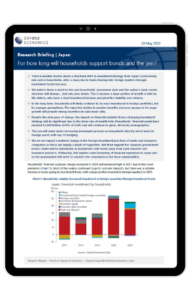For how long will Japan’s households support bonds and the yen?
 Households’ financial surpluses sharply increased in 2020 and remained high in 2021 due to the Covid pandemic. Most of the surplus continued to go to cash and deposits, but there was a notable increase in funds going to investment trusts (with a large portion invested in foreign equities) in 2021.
Households’ financial surpluses sharply increased in 2020 and remained high in 2021 due to the Covid pandemic. Most of the surplus continued to go to cash and deposits, but there was a notable increase in funds going to investment trusts (with a large portion invested in foreign equities) in 2021.
Amid rising international yield differentials and a weakening yen, there is market chatter about whether this is the beginning of a structural shift from households’ risk-averse investment style?
What you will learn:
- We believe the sharp rise in 2021 was temporary, driven by the strong performance of US equities and the dollar.
- But Japan’s households will likely continue to increase their foreign portfolio investment in the long term, albeit at a very gradual pace.
- Given the sheer size of household wealth, such a shift will have a profound impact on the yen and the Japanese government bonds (JGBs) market.
Tags:
Related posts

Post
How Asia’s supply chains are changing | Techonomics Talks
Global supply chains have continued to expand, despite talk of deglobalization and nearshoring. US and Japan have started to de-couple from China, but other G7 countries grow more dependent on Chinese inputs. Several "hotspots" are emerging across Asia with multiple winning formulas.
Find Out More
Post
BoJ to raise its policy rate cautiously to 1% by 2028
We now project that the Bank of Japan will start to raise its policy rate next spring assuming another robust wage settlement at the Spring Negotiation. If inflation remains on a path towards 2%, the BoJ will likely raise rates cautiously to a terminal rate of around 1% in 2028.
Find Out More
Post
Japan inflation to rise to 1.8%, but downside risks are high
Reflecting a surprisingly strong Spring Negotiation result and weaker yen assumption, we have upgraded our baseline wage and inflation forecasts. We now project higher wage settlements will push inflation towards 1.8% by 2027. Uncertainty is high, however.
Find Out More